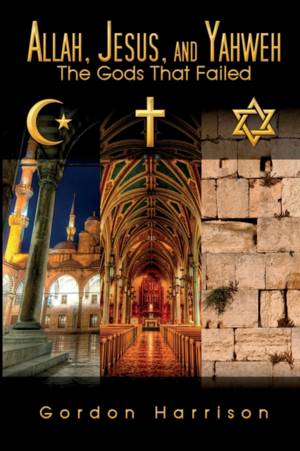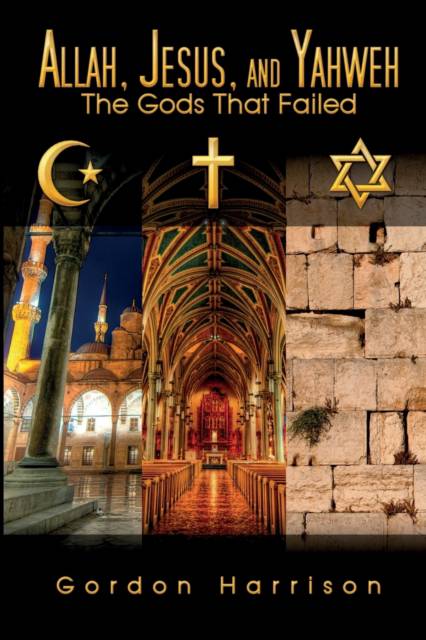
Je cadeautjes zeker op tijd in huis hebben voor de feestdagen? Kom langs in onze winkels en vind het perfecte geschenk!
- Afhalen na 1 uur in een winkel met voorraad
- Gratis thuislevering in België vanaf € 30
- Ruim aanbod met 7 miljoen producten
Je cadeautjes zeker op tijd in huis hebben voor de feestdagen? Kom langs in onze winkels en vind het perfecte geschenk!
- Afhalen na 1 uur in een winkel met voorraad
- Gratis thuislevering in België vanaf € 30
- Ruim aanbod met 7 miljoen producten
Zoeken
€ 49,95
+ 99 punten
Omschrijving
Twenty-first century's nightly news can't pass by without running another story on religious conflict or clashes. While these modern-day battles play out for the world to see, the issues that act as a catalyst for them are deeply embedded in ancient texts that claim to contain absolute certainties. An eye-opening and vitally-important new book has burst upon the literary scene called Allah, Jesus, and Yahweh: The Gods That Failed. The author, Gordon Harrison, conducts a definitive exposé of the ravages caused by religion and breaks new ground in the world of investigative literature. In this riveting history of three of the world's major religions-Islam, Christianity, and Judaism-this book explores the relationship between belief and the suspension of logic with its consequential suffering. Beginning with the September 480 BCE Battle of Marathon, the author traces the spread of Eastern belief systems (and the three major religions in particular) from the Middle East into Europe and the rest of the world. Citing examples of how fanatic elements of each faith have caused war, bloodshed, confusion and suffering, Harrison makes his case for reason and freethinking. As the author notes the parlance in vogue for this present invasion is a clash of civilizations-East versus West! But this is not entirely the case. There is a clash, but we have confused the combatants. Many in the West do not intend to fight for the preservation of Christianity; some in the East feel the same about Islam. What we will defend is freedom, democracy, and the values of the Enlightenment versus submission, dictatorship, and the buzz of the hive mind. A colossal clash of ideals is underway between the Enlightenment and the Army of the Night-those who "know" they have absolute certainty without evidence. Religion is certainty without proof; science is proof without certainty. From religion to science, it has been a long night's journey into light. Harrison asks the reader to hold his hand, walk with him through these pages, and see the glory and the horror we have created. Since its release, the book has garnered a consistent string of rave reviews-here are three: This is an extremely impressive book, one that should enlighten any open-minded reader, theist and non-theist alike. Harrison transports the reader from the ancient battle at Marathon across two millennia, following the march of civilization to the present day. He shows in a clear and engaging manner the moral corruption that is inherent in the ancient texts that continue to serve as the scriptural foundations of modern religions. His compelling mixture of philosophy, theology, astronomy, psychology and physics, presented always in a very accessible and entertaining style, persuasively demonstrates how science illuminates and promotes understanding while religion ossifies thinking patterns and all too often produces intergroup conflict. I highly recommend this book to all. By James Alcock, Professor of Psychology at York University, Toronto Something that worked really well for me was the author's use of personal anecdotes to illustrate some of his arguments. The one that really stood out was the story about Mother Courage. The author re-creates his experience with the bear and her cubs very vividly for the reader. I found it not only very germane to his point about the presence of morality in nature, but also very moving. This book deserves a wide readership. By Dirk Verhulst, English Teacher. Hilarious and powerful! Equal to anything written by Hitchens, Harris, Dawkins, and Dennett, the Four Horsemen of the Anti-Apocalypse. Allah, Jesus, and Yahweh takes a deeper view of time and a more humorous Mark Twain narrative approach than those authors do. By Bill Walker, Freethinker
Specificaties
Betrokkenen
- Auteur(s):
- Uitgeverij:
Inhoud
- Aantal bladzijden:
- 376
- Taal:
- Engels
Eigenschappen
- Productcode (EAN):
- 9780987959607
- Verschijningsdatum:
- 6/05/2013
- Uitvoering:
- Paperback
- Formaat:
- Trade paperback (VS)
- Afmetingen:
- 152 mm x 229 mm
- Gewicht:
- 503 g

Alleen bij Standaard Boekhandel
+ 99 punten op je klantenkaart van Standaard Boekhandel
Beoordelingen
We publiceren alleen reviews die voldoen aan de voorwaarden voor reviews. Bekijk onze voorwaarden voor reviews.









